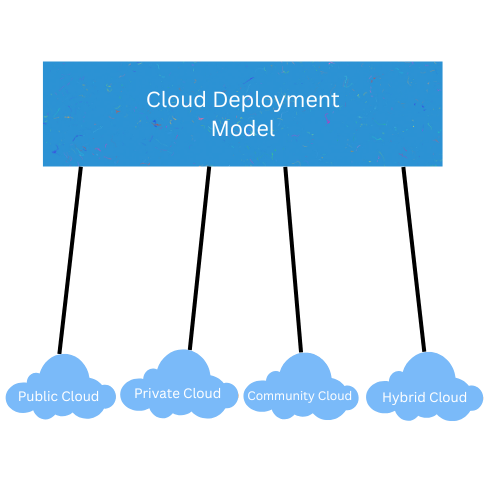
What is Cloud Computing?
Cloud computing refers to the practice of using a network of remote servers, hosted on the internet, to store, manage, and process data and applications. It allows users to access and utilize computing resources over the internet, eliminating the need to invest in and maintain physical infrastructure locally. Instead of running software or storing data on a local computer, users can access cloud-based services and applications from anywhere with an internet connection.
Key Concepts in Cloud Computing
Cloud computing offers several key concepts that define its nature and functionality:
- On-demand Self-Service: Cloud computing provides users with self-service capabilities, allowing them to provision and manage resources (e.g., virtual machines, storage, and applications) without involving the cloud service provider's assistance. This feature offers significant convenience and agility to users, enabling them to scale resources up or down as needed.
- Broad Network Access: Cloud services are accessible over the internet and can be reached from a variety of devices, including laptops, tablets, and smartphones. This ubiquity ensures that users can access cloud-based resources from virtually any location and at any time.
- Resource Pooling: Cloud providers consolidate computing resources to serve multiple users simultaneously. This multi-tenant model allows resources to be dynamically allocated and reallocated according to demand, optimizing resource utilization and reducing costs.
- Rapid Elasticity: Cloud resources can scale rapidly to meet fluctuations in demand. This elasticity allows users to expand or contract their resource usage based on workload variations, ensuring optimal performance during peak times and cost savings during periods of low activity.
- Measured Service: Cloud usage is typically measured and billed on a pay-as-you-go basis. Users only pay for the resources they consume, making it a cost-effective option for both individuals and organizations.
Cloud Deployment Models

Cloud computing offers several deployment models, each catering to specific needs and requirements:
- Public Cloud: In a public cloud deployment model, cloud computing resources are owned and operated by a third-party cloud service provider, who makes them available to the general public over the internet. These resources, such as virtual machines, storage, and applications, are shared among multiple customers. Public cloud services are typically offered on a pay-as-you-go basis, meaning users only pay for the resources they consume. The key features of public cloud deployments include scalability, cost-effectiveness, and minimal maintenance requirements for users. However, since resources are shared, some organizations may have concerns about data security and compliance in this model.
- Private Cloud: A private cloud deployment model involves cloud computing resources that are exclusively dedicated to a single organization. It can be hosted on-premises within the organization's data center or off-premises at a third-party provider's facility. The main characteristic of a private cloud is that it offers enhanced security, control, and privacy compared to the public cloud. Organizations that handle sensitive data, have specific compliance requirements, or need high customization often prefer private clouds. However, setting up and maintaining a private cloud can be more resource-intensive and expensive.
- Hybrid Cloud: The hybrid cloud deployment model is a combination of public and private cloud environments, allowing organizations to take advantage of the benefits of both. It involves integrating and managing resources across multiple cloud providers and on-premises infrastructure. In a hybrid cloud, data and applications can be moved between public and private environments as needed, providing flexibility and scalability. For instance, an organization might use the public cloud for non-sensitive tasks with fluctuating demands and a private cloud for secure and critical workloads. Hybrid clouds offer a strategic approach to cloud adoption, providing seamless integration of existing infrastructure with cloud resources. However, the complexity of managing two different environments can be a challenge.
- Community Cloud: The community cloud deployment model caters to specific communities or organizations with shared interests, compliance requirements, or security concerns. It is essentially a multi-tenant cloud infrastructure that is accessible only by a select group of users. In this model, the cloud resources and costs are shared among the members of the community, making it more cost-effective than a private cloud. Community clouds are often used in industries such as healthcare, finance, or government, where entities need to collaborate while adhering to strict regulatory standards. Choosing the most suitable cloud deployment model depends on an organization's unique requirements, budget, and security considerations. Some organizations may even adopt a multi-cloud approach, utilizing multiple cloud providers to leverage the strengths of each model.
Cloud Computing in Ethical Hacking and Cybersecurity
The advent of cloud computing has had a profound impact on the field of ethical hacking and cybersecurity:
- Security Testing and Vulnerability Assessments: Cloud-based infrastructure offers a scalable and flexible environment for security professionals to conduct security testing and vulnerability assessments. With cloud resources, ethical hackers can simulate various attack scenarios, test application security, and identify potential vulnerabilities without investing in costly physical infrastructure.
- Secure Data Storage: Cloud storage services provide robust security features, including encryption, access controls, and data redundancy. Ethical hackers and cybersecurity experts can securely store sensitive data, logs, and backups in the cloud, minimizing the risk of data loss or unauthorized access.
- Real-time Threat Intelligence: Cloud-based threat intelligence platforms enable rapid collection, analysis, and dissemination of security-related information. These platforms provide valuable insights into emerging threats, allowing ethical hackers to proactively defend against potential attacks.
- Collaborative Security Research: Cloud computing facilitates collaboration among ethical hackers and cybersecurity experts worldwide. Cloud-based platforms enable secure sharing of research findings, tools, and methodologies, fostering a stronger and more informed cybersecurity community.